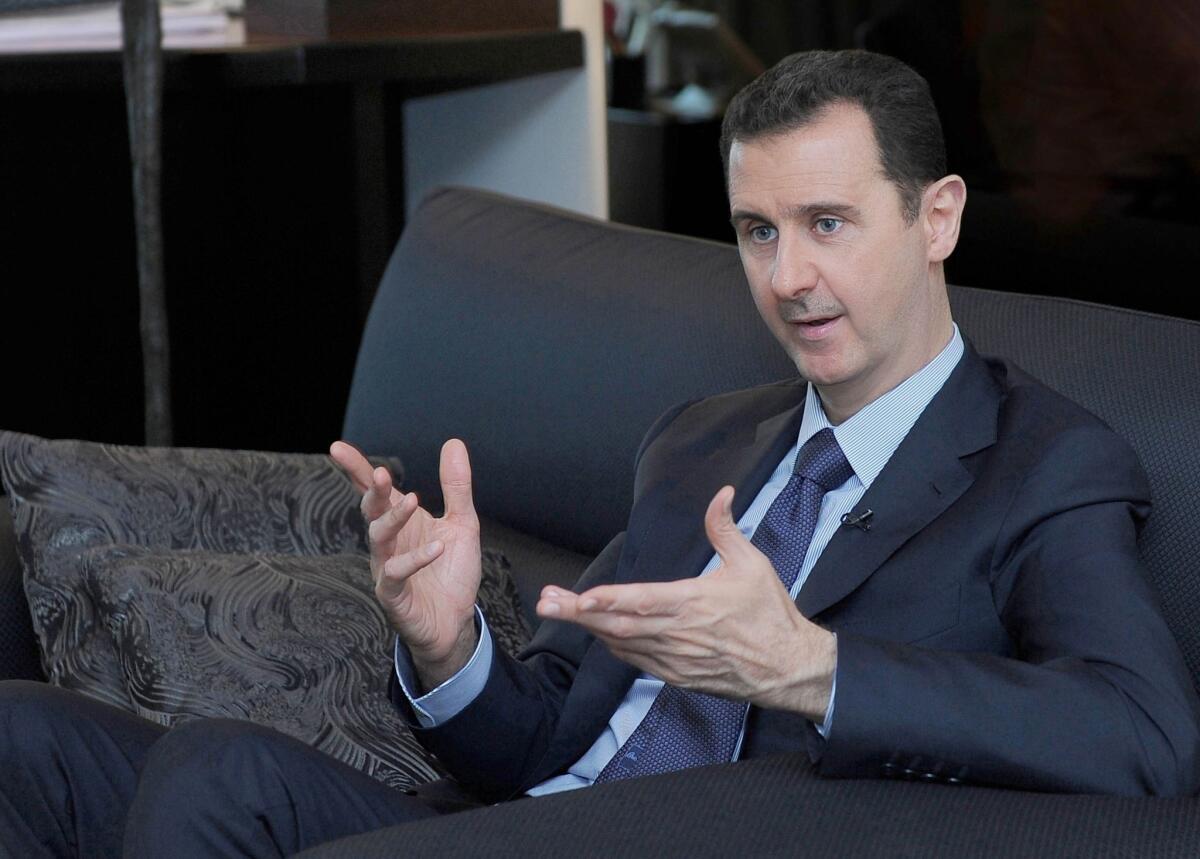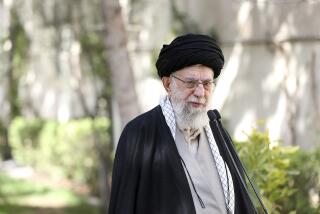Syria’s Assad denies use of chemical weapons

BEIRUT -- Syrian President Bashar Assad labeled allegations that Syrian forces deployed chemical weapons as “preposterous” and “completely politicized,” according to comments published Monday from an interview with a Russian newspaper.
“How is it possible that any country would use chemical weapons, or any weapons of mass destruction, in an area where its own forces are located?” Assad asked in the interview with Izvestia, according to a translation provided by Syria’s official news agency. “This is preposterous! These accusations are completely politicized and come on the back of the advances made by the Syrian Army against the terrorists.”
For months, Syrian forces have been engaged in an aggressive offensive outside Damascus aimed at pushing back and eliminating rebels, whom the government routinely refers to as terrorists.
Opposition activists have alleged that hundreds of civilians were killed Wednesday in a poison-gas bombardment of the eastern suburbs of Damascus, a rebel stronghold. Though the opposition says the targeted districts were under rebel control, Assad pointed out that the disputed districts are adjacent to Syrian military positions.
Syrian authorities and their Russian allies have charged that it was the rebels who unleashed chemical agents in a bid to discredit the government and spur a U.S.-led military attack on Syrian forces. The opposition has denied using chemical arms.
Independent experts who have seen video of reported victims of last week’s suspected attack say the images are inconclusive, but could point to use of some kind of chemical agent.
The Syrian president’s comments -- his first public remarks about the alleged poison-gas strike -- came as United Nations inspectors reportedly headed early Monday to the area where the suspected attack took place. On Sunday, Syria agreed to allow access to a 20-member U.N. technial team that was already on the ground in Damascus, the Syrian capital.
In the interview, Assad said Syria had sought “guidelines” to ensure that any evidence gathered by the U.N. is analyzed in an unbiased fashion.
“The issue is not only how the investigation will be conducted but also how the results will be interpreted,” Assad told Izvestia. “We are all aware that instead of being interpreted in an objective manner, these results could easily be interpreted according to the requirements and agendas of certain major countries. Certainly, we expect Russia to block any interpretation that aims to serve American and western polices.”
On Sunday, the Obama administration dismissed as “too late” Syria’s decision to allow access for U.N. experts. The White House said there was “very little doubt” that Syrian forces had used poison gas against civilians, a statement that appeared to move the U.S. closer to a military strike against Syria in response.
On Monday, Russia said that Foreign Minister Sergei Lavrov had warned his U.S. counterpart, Secretary of State John F. Kerry, about the “extremely dangerous consequences” of launching military action against Syria.
In rejecting allegations that Syria deployed poison gas, Russian officials have argued that rebels had a clear motivation -- to spur a Western-led attack on Syrian forces -- while Assad had every reason to avoid any action that could spur international intervention at a time when his forces were winning the more than two-year war.
“The West does not want to answer the main question: Why would Assad use chemical weapons?” the head of Russia’s parliamentary international affairs committee, Aleksey Pushkov, asked on his Twitter account, according to BBC Monitoring, which translates foreign media reports. “To give grounds for invasion? To dig his own grave?”
ALSO:
U.S. dismisses Syria’s inspection offer as ‘too late’
Siege of Syrian capital’s districts, suburbs cuts off food, medicine
In Syria, the acrobatic street game parkour gives youths an escape
More to Read
Sign up for Essential California
The most important California stories and recommendations in your inbox every morning.
You may occasionally receive promotional content from the Los Angeles Times.









